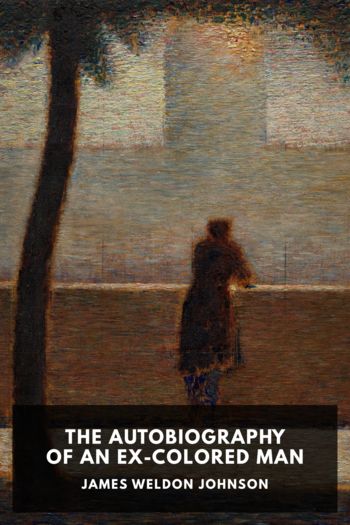The Autobiography of an Ex-Colored Man, James Weldon Johnson [best books to read in life .TXT] 📗

- Author: James Weldon Johnson
Book online «The Autobiography of an Ex-Colored Man, James Weldon Johnson [best books to read in life .TXT] 📗». Author James Weldon Johnson
Much, too, that I saw while on this trip, in spite of my enthusiasm, was disheartening. Often I thought of what my “millionaire” had said to me, and wished myself back in Europe. The houses in which I had to stay were generally uncomfortable, sometimes worse. I often had to sleep in a division or compartment with several other people. Once or twice I was not so fortunate as to find divisions; everybody slept on pallets on the floor. Frequently I was able to lie down and contemplate the stars which were in their zenith. The food was at times so distasteful and poorly cooked that I could not eat it. I remember that once I lived for a week or more on buttermilk, on account of not being able to stomach the fat bacon, the rank turnip-tops, and the heavy damp mixture of meal, salt, and water which was called corn bread. It was only my ambition to do the work which I had planned that kept me steadfast to my purpose. Occasionally I would meet with some signs of progress and uplift in even one of these back-wood settlements—houses built of boards, with windows, and divided into rooms; decent food, and a fair standard of living. This condition was due to the fact that there was in the community some exceptionally capable Negro farmer whose thrift served as an example. As I went about among these dull, simple people—the great majority of them hard working, in their relations with the whites submissive, faithful, and often affectionate, negatively content with their lot—and contrasted them with those of the race who had been quickened by the forces of thought, I could not but appreciate the logic of the position held by those Southern leaders who have been bold enough to proclaim against the education of the Negro. They are consistent in their public speech with Southern sentiment and desires. Those public men of the South who have not been daring or heedless enough to defy the ideals of twentieth-century civilization and of modern humanitarianism and philanthropy, find themselves in the embarrassing situation of preaching one thing and praying for another. They are in the position of the fashionable woman who is compelled by the laws of polite society to say to her dearest enemy: “How happy I am to see you!”
And yet in this respect how perplexing is Southern character; for, in opposition to the above, it may be said that the claim of the Southern whites—that they love the Negro better than the Northern whites do—is in a manner true. Northern white people love the Negro in a sort of abstract way, as a race; through a sense of justice, charity, and philanthropy, they will liberally assist in his elevation. A number of them have heroically spent their lives in this effort (and just here I wish to say that when the colored people reach the monument-building stage, they should not forget the men and women who went South after the war and founded schools for them). Yet, generally speaking, they have no particular liking for individuals of the race. Southern white people despise the Negro as a race, and will do nothing to aid in his elevation as such; but for certain individuals they have a strong affection, and are helpful to them in many ways. With these individual members of the race they live on terms of the greatest intimacy; they entrust to them their children, their family treasures, and their family secrets; in trouble they often go to them for comfort and counsel; in sickness they often rely upon their care. This affectionate relation between the Southern whites and those blacks who come into close touch with them has not been overdrawn even in fiction.
This perplexity of





Comments (0)